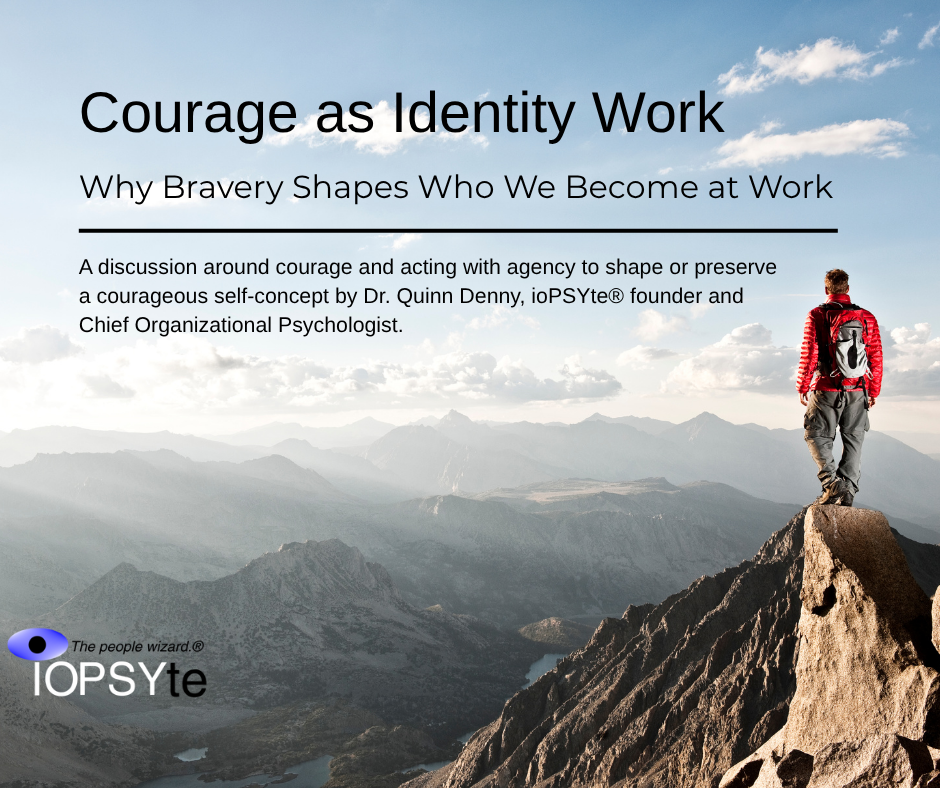Dr. Quinn Denny
 What is it we think of first when we think of courage? If we are like what I believe most of the population, we think about being brave. As it relates to bravery, we might think about overcoming or moving through fear to do something risky, challenging or difficult. This is most certainly part of the composition of courage and yet courage is much more. A part of courage is being who we are and becoming what we want to be. What does that mean? Psychologists like me term this “Identity Work”. What is Identity Work?
What is it we think of first when we think of courage? If we are like what I believe most of the population, we think about being brave. As it relates to bravery, we might think about overcoming or moving through fear to do something risky, challenging or difficult. This is most certainly part of the composition of courage and yet courage is much more. A part of courage is being who we are and becoming what we want to be. What does that mean? Psychologists like me term this “Identity Work”. What is Identity Work?
The best way to begin to describe Identity Work in Courage, I think, is to ask ourselves a few questions and answer them. What does courage most often require? Answer, a person or persons to behave courageously. As we say in psychology these brave persons have agency, they act deliberately in a certain way. In our example it is courageously. People who behave bravely, who behave courageously under extreme circumstances and opposition we call heroes. Our movies are full of heroes that do a myriad of courageous acts, everything from standing up to the tyrant boss, or attempting romance with that person who seems out of one’s reach to showing themselves the champion in battle or the hero giving their life for a premiere cause.
Next question, how many people do you think picture themselves as the villain or the weaker characters in need of a hero? If you say to yourself, very few, I think you are correct. Another question, why is it that we each would like to be a hero in some sense? Answer, because there is something attractive about having that kind of courage, about “being” courageous. That is courage as identity or self-concept. To have a self-concept that includes courage is also to have that self-concept positively impact self-esteem. In other words, to be courageous feels good. No, that is too mild, it feels great!
Do you want to feel courageous and great? So do I! Acting courageously, whether visibly by doing something observable (overt courage) or by doing mental and emotional work others can’t see (covert courage) has an impact on our self-concept and therefore self-esteem. We can act courageously to create the self-concept we want or we can act to preserve our current courageous self-concept. Both of these situations create an inner conflict called cognitive dissonance, we want how we behave and who we think we are to match up and when they don’t we experience psychological angst (Luthans et al., 2015). It is justifiable to believe that much courageous behavior is identity work, both what we think of ourselves and how we perceive others to think of us (Koerner, 2014). How do you build your courageous identity?
You must act courageously. What?! It really is that simple, almost. Acting courageously involves a thought process where we determine if the intended outcome is worth the risk, and crucially, if we believe we have what it takes to perform that overt/covert courageousness. In the case of building or preserving our courageous self, it is the gain or loss of identity, it is how much we value that identity. Let’s get practical so you can convert this knowledge into wisdom (knowledge you behave).
In our search for more courage, we must know that courage is not reckless, rather it is calculated action considering risk. The best way I have found to grow courage is by a series of consecutive wins. Meaning that we behave courageously several times and experience positive resulting outcomes. This builds confidence which is positively related to being courageous. Start small, this is key. Pick one little thing, maybe it is something physical that scares you. It could be relational, sharing your true feelings and thoughts in a specific situation or with particular people. Know that courage does involve real risk, I prefer to be courageous and at least know that I tried. Often, the outcome doesn’t matter, it matters that we are true to ourselves, that we avoid sacrificing our identity, we promote our strength. Try this takeaway exercise.
Pick one thing that you avoid doing because of risk-fear. This should be something where you feel like you are not being true to who you want to be, that courageous you. Remember, make this a small thing for this first iteration. Determine a specific behavior that you can do that will push you a bit out of your comfort zone without pushing you past what you can handle psychologically-physically. Decide how many times (frequency) for how long (duration) you will do this specific small behavior. Then…do it!
Koerner, M. M. (2014). Courage as identity work: Accounts of workplace courage. Academy of Management Journal, 57(1), 63-93
Luthans, F., Youssef-Morgan, C. M., & Avolio, B. J. (2015). Psychological capital and beyond. Oxford University Press.